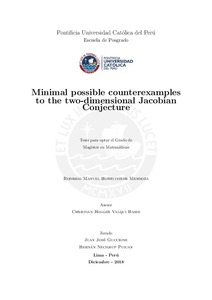Minimal possible counterexamples to the two-dimensional Jacobian Conjecture
Abstract
Let K be an algebraically closed field of characteristic zero. The Jacobian Conjecture (JC) in dimension two stated by Keller in [8] says that any pair of polynomials P;Q ∈ L := K[x; y] with [P;Q] := axPayQ - axQayP ∈ Kx (a Jacobian pair )
defines an automorphism of L via x-> P and y -> Q. It turns out that the Newton polygons of such a pair of polynomials are closely related, and by analyzing them, much information can be obtained on conditions that a Jacobian pair must satisfy. Specifically, if there exists a Jacobian pair that does not define an automorphism (a counterexample) then their Newton polygons have to satisfy very restrictive geometric conditions. Based mostly on the work in [1], we present an algorithm to give precise geometrical descriptions of possible counterexamples. This means that, assuming (P;Q) is a counterexample to the Jacobian Conjecture with gcd(deg(P); deg(Q)) = k, we can generate the possible shapes of the Newton Polygon of P and Q and how it transforms under certain linear automorphisms. By analyzing the minimal possible counterexamples, we sketch a path to increase the lower bound of max(deg(P); deg(Q)) to 125 for a minimal possible counterexample to the Jacobian Conjecture. Sea K un cuerpo algebraicamente cerrado de característica zero. La Conjetura del
Jacobiano en dimensión dos postulada por Keller en [8] dice que cualquier par de
polinomios P;Q ∈ L := K[x; y] with [P;Q] := axPayQ - axQayP ∈ Kx (un par
Jacobiano) define un automofismo de L via x-> P and y -> Q.
Resulta que los polígonos de Newton de tal par de polinomios están relacionados
íntimamente, y al analizarlos, mucha información puede ser obtenida sobre condiciones
que un par Jacobiano debe satisfacer. Específicamente, si existe un par Jacobiano
que no define un automorfismo (un contraejemplo) entonces sus polígonos de Newton
deben satisfacer condiciones geométricas bastante restrictivas.
Basado en gran parte en el trabajo en [1], presentamos un algoritmo para
dar una descripción geométrica precisa de posibles contraejemplos. Esto significa
que, asumiendo que (P;Q) es un contraejemplo a la Conjetura del Jacobiano con
gcd(deg(P); deg(Q)) = k, podemos generar las posibles formas del Polígono de
Newton de P y Q y cómo se transforman bajo ciertos automorfismos lineales.
Al analizar los posibles contraejemplos minimales, esbozamos un camino para
incrementar la cota inferior de max(deg(P); deg(Q)) a 125 para un posible
contraejemplo minimal a la Conjetura del Jacobiano.
Temas
Polinomios
Geometría algebraica
Automorfismo
Geometría algebraica
Automorfismo
Para optar el título de
Maestro en Matemáticas
Collections
The following license files are associated with this item:






